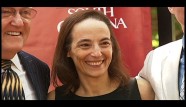U.S. Funding for Aging-Related Technology

Israeli researchers working on technology that contributes to public health, especially to that of the elderly population, can receive assistance in the United States from Sue Levkoff, a University of South Carolina researcher and the vice president of Environment and Health Inc., a start-up company that focuses on the development of technologies that enable older adults to age in place.
Levkoff recently toured Israel, offering researchers suggestions for evaluating technologies in the US market with funding available from sources such as the NIH’s National Institute on Aging (NIA), through Small Business Innovation Research (SBIR) grants.
Levkoff, who is Director of the USC SmartState SeniorSMART Center of Economic Excellence has an impressive track record: she has collaborated on more than ten public health technology grants focused on enabling older adults to age in place and in community.
She notes that Health Care Reform Legislation in the US has resulted in billions of dollars being available for small companies to finance proof-of-concept projects and then to conduct clinical trials. The SBIR Phase 1 awards are from six months to one year and typically in the $150,000 to $300,000 range including direct and indirect costs. The Phase 2’s are for two years, and are typically in the $750,000 to $1,000,000 range.
One promising Israeli company that Levkoff feels will be of special interest to the NIA is a product for older adults who have experienced a range of conditions, like stroke, that put them at risk to falls.
“Falls are one of the major predictors of high cost hospitalization, unintended injuries, and mortality among older adults,” says Levkoff. “What makes the Israeli product potentially so special is that if the randomized trial proves a success, the product could be identified as an ‘evidence-based rehabilitation intervention,’ which could then become a reimbursable cost through the Centers for Medicaid and Medicare (CMS).”
Another company that caught her attention has a product that she feels will be especially important to congestive heart failure (CHF) patients. The product provides remote monitoring of vital signs, including respiration and pulse, and apnea in a single device. “I expect that a study aimed at demonstrating the efficacy of this device in a population of older adults in preventing readmissions to hospitals for a condition like CHF – a condition for which readmissions will soon no longer be reimbursed in the US — will be viewed favorably,” observes Levkoff.
Projects that Levkoff’s organization has previously secured research funding for include a sensor for the detection of human falls that was originally developed to detect instability in bridges.
Other NIA-funded projects include developing on-line communities for Spanish and Chinese-speaking dementia caregivers.
Based on her discussions with Israeli experts, Levkoff cites a need to develop a similar on-line support community for Filipino and other foreign caregivers in Israel.
“I believe that that we can develop an active South Carolina-Israeli Research Exchange Program to foster the evaluation of Israeli technologies in the US that are designed to allow the elderly to age with dignity, says Levkoff. “My dream outcome would be producing several collaborative US-Israeli technology evaluations funded from the NIH in the near future.”
Levkoff’s visit to Israel was part of a delegation organized by the American-Israel Chamber of Commerce, SE Region (AICC) as part of the South Carolina-Israel Collaboration, a program managed by the Chamber. “The University of South Carolina’s SeniortSMART, under Dr. Levkoff’s leadership, provides a unique opportunity for Israeli companies that have technologies to address issues facing the aging population and their caregivers,” notes Tom Glaser, President of AICSE. “South Carolina is a leader in this field, and we envision organizing a delegation of Israeli companies to come to the state in 2012 to meet companies and organizations who could be customers, partners, and investors for them.”
AICSE has pioneered the development of industry-specific business exchanges and Glaser believes that it will be possible to build a successful aging technology cluster.

